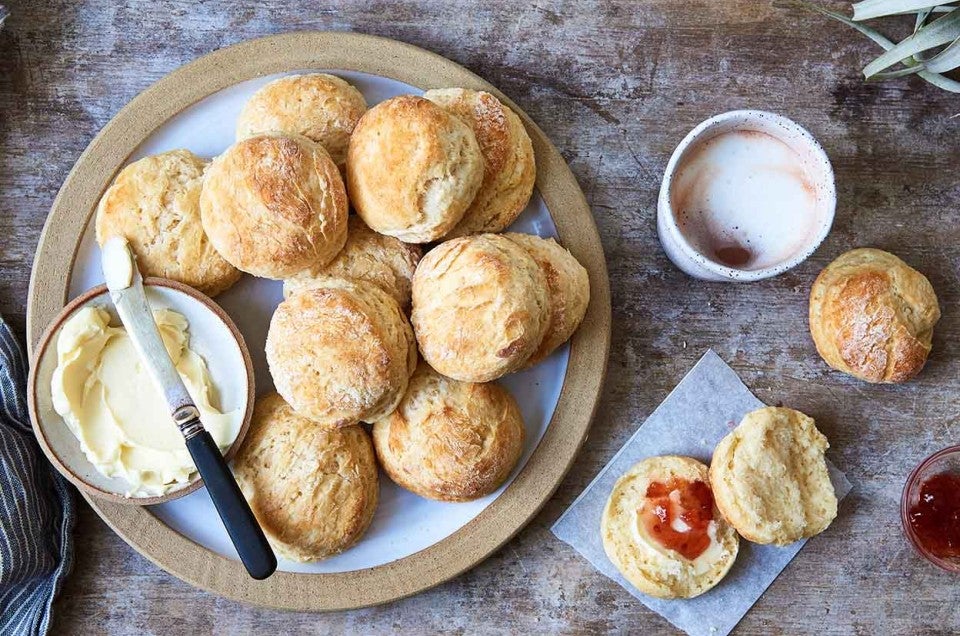


Pssst... I've never been the world's best biscuit baker.
But I have an excuse: I'm not from the South, whence all good biscuits come.
Attention, Southern biscuit bakers: I won't argue with you. You've got the biscuit thing down cold. Um, make that hot.
The best biscuits I've ever had have been off Interstate 75, the main drag connecting Florida and central Georgia.
It seems any bend in the road big enough for a gas station and a boiled peanut stand also has a little grocery store or luncheonette advertising hot biscuits.
Maybe it's that soft Southern flour. Perhaps it's the general air of relaxation one often finds in the Deep South; everyone knows you can't make good biscuits with a heavy hand. But probably it's generational memory: the practiced motions of stirring buttermilk and flour, patting dough, a twist of the wrist with the cutter. Performed over and over again throughout a lifetime, these actions become as normal as breathing.
I must say, the only other bakers I've found who can match those Southern cooks biscuit for biscuit are Mainers. Maine biscuits are SOME good (as we'd say in the Pine Tree State; I lived there for 15 years). And, despite my biscuit-baking shortcomings, I can bake a decent biscuit using the recipe on the back of the can of Maine Bakewell Cream.
Still, biscuits aren't something I've got down pat... pat... pat.
So when I ran across this recipe for Angel Biscuits—with its assurance that “even a new bride can make them”—I took the bait. And, while they're not true Southern biscuits—tall, light, tender—this interesting cross between a biscuit and yeast roll has its own endearing qualities.
First, it's difficult to make these badly—it's true, even a “new bride” could succeed here.
Second, the freshness quotient. Unlike traditional baking powder biscuits, whose peak of perfection is here and gone in the space of 20 minutes, Angel Biscuits segue smoothly from biscuit-like when hot, to soft yeast roll when cool.
Call them Southern biscuits with Northern attitude.
Or biscuits even I, a bride of 33 years, can make.
Follow along with the Angel Biscuits recipe as you look at these pictures.
First, mix together flour, instant yeast, sugar, salt, and baking powder. Add the shortening and butter, which you've cut into pats or chunks.
Mix until unevenly crumbly.
Add room-temperature milk. Cold milk will slow down the yeast. Warm milk will melt the fat. Room temperature is best.
Mix quickly and thoroughly.
A Danish dough whisk works beautifully.
Notice how the wet dough doesn't stick in the loops of the whisk.
Flour your work surface heavily. A rolling mat makes cleanup easy.
Dump the sticky dough onto the floured surface, and sprinkle a bit more flour on top.
Gently pat the dough till it smooths out, lifting it to sprinkle more flour underneath if it starts to stick. I rely on my giant spatula for the heavy lifting.
Give the top of the dough a few quick swipes with a rolling pin to smooth it out, if you like.
The dough should be about 3/4” thick.
Use a 2” round biscuit cutter to cut biscuits.
You'll have scraps left over.
Gently gather them and shape into an oblong that's as wide as your cutter. That way, you can pretty much cut the dough without having to re-roll it yet again.
Space the biscuits on a parchment-lined or lightly greased baking sheet. Cover them and let them rest for an hour. You won't notice any rise, but the yeast is doing its work nonetheless.
After an hour, place the pan of biscuits into the freezer for an hour. Can you bake without freezing first? Of course. Frozen biscuits will bake up somewhat higher than fresh, due to the higher melting point of the fat, which lets the biscuits rise and set before the fat melts.
When you're ready to bake them, brush each biscuit with melted butter, if desired. This will give the biscuits added flavor (as well as a slightly speckled top—caveat emptor).
Here they are, ready to go into the oven.
Place the biscuits in a 400°F oven.
Fifteen minutes later, they're starting to brown.
Remove them from the oven when they're golden.
Notice the distinctly yeast roll-like texture of this hybrid.
OK, side trip: What happens if you add chips? I decided to find out. In the front, cinnamon chips. Behind them, cinnamon Flav-R-Bites. To the right, chocolate chips.
I divided the dough into four pieces—like Gaul, for you Roman history scholars. Each of three pieces got chips; the fourth was the chip-less control.
Pat and smooth...
Divide into biscuits...
Square biscuits are just as good as round, albeit not quite as traditional.
I decided to top some with Cinnamon-Sugar Plus, our “gritless” cinnamon-sugar blend.
After that, into the freezer for an hour.
Here they are after about 16 minutes in the oven.
Very tasty; I definitely wouldn't hesitate to add chips to my angel biscuits.
Here's the result of an experiment I did along the way. The biscuit on the left is all-butter. On the right, part butter, part shortening. Shortening, with its higher melting point, definitely helps these biscuits rise higher.
Another experiment. The biscuit on the left was baked immediately after being shaped. On the right, frozen for 60 minutes, then baked. Freezing accomplishes much the same thing that shortening (vs. butter) does; it keeps the fat in solid form long enough for the biscuits to rise and set, before the fat melts.
Read, rate, and review (please!) our recipe for Angel Biscuits.

